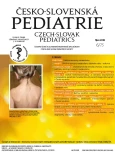-
Medical journals
- Career
Newborn screening of inherited metabolic diseases in the Czech Republic
Authors: K. Pešková 1; P. Chrastina 1; J. Bártl 1; T. Adam 2; F. Votava 3; T. Honzík 1; V. Kožich 1
Authors‘ workplace: Klinika dětského a dorostového lékařství 1. LF UK a VFN, Praha 1; Laboratoř dědičných metabolických poruch OKB, Fakultní nemocnice Olomouc, Olomouc 2; Klinika dětí a dorostu 3. LF UK a FN Královské Vinohrady, Praha 3
Published in: Čes-slov Pediat 2018; 73 (6): 390-394.
Category:
Overview
Newborn screening of inherited metabolic diseases is a preventative program; it enables an early diagnosis and effective treatment of patients with these rare diseases and thus improves their quality of life. Newborn screening programs are expanding worldwide due to the progress in technology and treatment.
In the Czech Republic, the newborn screening program started by detecting phenylketonuria in 1975 and expanded gradually by addition of other inherited metabolic disorders in 2009 and 2016. At present 15 inherited metabolic disorders are searched for as primary targets, however, the screening program may detect other diseases that are not primarily searched for.
Determination of metabolites by tandem mass spectrometry or of enzyme activities by fluorimetry in dried blood spots are the primary approaches for newborn screening of inherited metabolic disorders. The quality of dried blood spots is the prerequisite for achieving relevant results.
Newborn screening may generate false positive results; the likelihood of false positivity in screening of inherited metabolic disorders is currently 1 : 1000. False negative results are rare, but it is necessary to think about such possibility.
Since 2010, a total of 268 patients with targeted diseases or relevant condition such as vitamin B12 deficiency or partial biotinidase deficiency were detected.
The overall incidence of 15 inherited metabolic disorders in newborn screening in the population of the Czech Republic is approximately 1 : 2500 and it is comparable to well-functioning screening programs abroad.
KEY WORDS:
inborn errors of metabolism, newborn screening, tandem mass spectrometry, dried blood spot, rare diseases
Sources
1. Naylor EW, Chace DH. Automated tandem mass spectrometry for mass newborn screening for disorders in fatty acid, organic acid and amino acid metabolism. J Child Neurol 1999; 14 (Suppl 1): 4–8.
2. Loeber JG, Burgard P, Cornel MC, et al. Newborn screening programmes in Europe; arguments and efforts regarding harmonization. Part 1. From blood spot to screening result. J Inherit Metab Dis 2012; 35 (4): 603–611.
3. Therrell BL, Padilla CD, Loeber JG, et al. Current status of newborn screening worldwide: 2015. Semin Perinatol 2015; 39 (3): 171–187.
4. Wilson JMG, Jungner J. Principles and Practice of Screening for Disease. Geneva: World Health Organization, Public Health Papers 1968; No. 34. http://whqlibdoc.who.int/php/WHO_PHP_34.pdf. Accessed August 26, 2018.
5. Věstník Ministerstva zdravotnictví ČR z roku 2016, částka 6, ze dne 31. května 2016; 2–11.
6. Beaudet AL, Sly WS, Valle D. Genetics, biochemistry, and molecular basis of variant human phenotypes. In: Scriver CR; Sly WS, Valle D. The Metabolic and Molecular Bases of Inherited Disease. 7th ed. McGraw-Hill, 1995.
Labels
Neonatology Paediatrics General practitioner for children and adolescents
Article was published inCzech-Slovak Pediatrics

2018 Issue 6-
All articles in this issue
- Characteristic clinical features and laboratory findings of inborn errors of metabolism
- Phosphomannomutase 2 deficiency: clinical, biochemical and molecular analyses in 22 Czech patients
- A complex view of vitamin B12 deficiency in childhood
- Barth syndrome – case history
- Newborn screening of inherited metabolic diseases in the Czech Republic
- Nutritional therapy in patients with inherited metabolic disorders
- Lysosomal storage disorders – development of diagnostic process and treatment in Slovakia
- Czech-Slovak Pediatrics
- Journal archive
- Current issue
- Online only
- About the journal
Most read in this issue- Characteristic clinical features and laboratory findings of inborn errors of metabolism
- A complex view of vitamin B12 deficiency in childhood
- Newborn screening of inherited metabolic diseases in the Czech Republic
- Lysosomal storage disorders – development of diagnostic process and treatment in Slovakia
Login#ADS_BOTTOM_SCRIPTS#Forgotten passwordEnter the email address that you registered with. We will send you instructions on how to set a new password.
- Career

